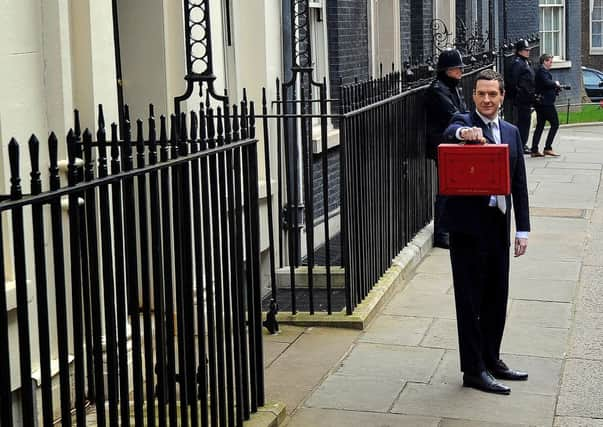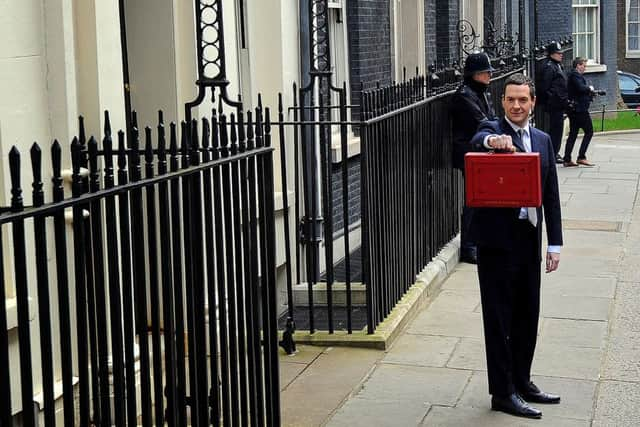Video: BUDGET LATEST - beer duty cut by a penny a pint


Duty on cider and spirits such as Scotch whisky will be cut by 2% and wine duty will be frozen.
Drivers were cheered by the cancellation of the fuel duty escalator for the fifth year running.
Advertisement
Hide AdAdvertisement
Hide AdMr Osborne said the freeze on fuel duty would result in “£10 off a tank with the Tories”.


Further help for drivers came in the form of a reduction in toll rates charged on the Severn bridges linking England and Wales. The higher band for small vans and buses will be abolished from 2018, he said.
This will see the toll rate fall from £13.10 to £5.40 - the same as for cars.
Duty on tobacco will be frozen.
Chancellor of the Exchequer George Osborne said families are better off now than they were five years ago during his sixth Budget speech today.Mr Osborne said that “Britain is walking tall again” with faster growth than any major economy.
Advertisement
Hide AdAdvertisement
Hide AdLatest projections show living standards “will be higher than when we came to office”, said the Chancellor.
Mr Osborne said: “We set out a plan. That plan is working. Britain is walking tall again.”
The “central judgement” of the Budget is “to use whatever additional resources we have to get the deficit and the debt falling”.
Government’s goal is for the UK to be “the most prosperous major economy in the world, with that prosperity widely shared”, said the Chancellor.
Advertisement
Hide AdAdvertisement
Hide AdOffice for Budget Responsibility confirms that, at 2.6% UK growth faster than any other major economy last year.
OBR revises down growth in world economy, growth in world trade and the prospects for the eurozone.
Trade deficit figures published last week are “the best for 15 years”.
Chancellor increases UK Trade and Investment resources to double support for British exporters to China.
Advertisement
Hide AdAdvertisement
Hide AdOBR revises forecast growth for 2015 upwards from 2.4% in Autumn Statement to 2.5% now. Forecast for 2016 revised upwards to 2.3%, then 2.3% in 2017 and 2018 and 2.4% in 2019.
OBR forecasts unemployment to fall to 5.3% this year.
Mr Osborne said that people are better off at the end of this Parliament than five years ago, with GDP per capita up by 5% and real household disposable income higher in 2015 than 2010.
Average household around £900 better off in 2015 than 2010, with living standards set to grow strongly every year until 2020, said Mr Osborne.
OBR revises down inflation forecast for this year to 0.2%, and revises it down for the falling three years.
Advertisement
Hide AdAdvertisement
Hide AdRemit for Bank of England monetary policy committee remains a 2% symmetric CPI inflation target.
Farmers to be allowed to average incomes for tax purposes over five years.
Treasury pays off debts from South Sea Bubble, First World War and Gladstone era and increases the number of long-dated gilts it sells.
Welfare bills set to be an average of £3 billion lower each year than predicted in December, and interest charges on Government gilts £35 billion lower.
Advertisement
Hide AdAdvertisement
Hide AdTreasury to sell at least a further £9 billion of Lloyds Bank shares in the coming year and launch sale of £13 billion of mortgage assets from Northern Rock and Bradford & Bingley.
Resources from bank sales, lower interest payments and lower welfare bills to be used to pay down the national debt.
Government has met its 2010 target to end this Parliament with Britain’s national debt falling as a share of GDP.
Debt as a share of GDP falls from 80.4% in 2014/15 to 80.2% in 2015/16, then 79.8%, 77.8% and 74.8% in subsequent years before reaching 71.6% in 2019/20.
Advertisement
Hide AdAdvertisement
Hide AdSqueeze on public spending to end a year earlier than planned, so that in 2019/20 spending grows in line with the growth of the economy - bringing state spending as a share of national income to the same level as in 2000.
OBR confirms deficit is less than half of that inherited from the previous government, but at 5% this year “it’s still far too high and it must come down”.
Deficit forecasts from Autumn Statement revised downwards to 4% in 2015/16, 2% in 2016/17 and 0.6% in 2017/18. Budget surplus of 0.2% forecast for 2018/19 and 0.3% for 2019/20.
Borrowing forecast for this year revised downwards to £90.2 billion, then £75.3 billion in 2015/16, £39.4 billion, £12.8 billion in subsequent years - a total of £5 billion less borrowing than forecast in December.
Advertisement
Hide AdAdvertisement
Hide AdBudget surplus of £5.2 billion forecast for 2018/19 and £7 billion for 2019/20.
To deliver falling debt, Government must achieve £30 billion further savings by 2017/18 - £13 billion from Government departments, £12 billion from welfare savings and £5 billion from clamping down on tax avoidance and evasion, said Mr Osborne.
Decisions across this Parliament mean “the rich are making the biggest contribution to deficit reduction”, said the Chancellor.
Funding provided for “major expansion” of mental health services for children and those suffering from maternal mental illness.
Advertisement
Hide AdAdvertisement
Hide AdShare of income tax paid by top 1% of earners projected to rise from 25% in 2010 to more than 27% this year, while lower-paid 50% of earners pay a smaller proportion than under Labour.
Pension pot lifetime allowance to be reduced from £1.25 million to £1 million from next year, saving £600 million annually.
Government to legislate next week on diverted profits tax aimed at multinationals shifting profits offshore, and bring it into effect at the start of April.
Tax rules to be tightened to prevent contrived loss arrangements, use of foreign branches to reclaim VAT on overheads, clampdown on “umbrella companies” and ensure entrepreneurs relief is only available to those selling genuine stakes in businesses.
Advertisement
Hide AdAdvertisement
Hide AdMeasures on tax avoidance and evasion to raise £3.1 billion over the forecast period.
Review on the use of deeds of variation to avoid inheritance tax to report by the autumn.
Banks to be barred from deducting compensation for mis-selling from corporation tax. In total, new banking taxes to raise £5.3 billion across forecast period.
A further £75 million from Libor fines to go to charities for regiments which fought in Afghanistan and Government to contribute towards permanent memorial to those who died in Afghanistan and Iraq and help renovate Battle of Britain memorials.
Advertisement
Hide AdAdvertisement
Hide AdChancellor announces £1 million to buy defibrillators for public places, including schools.
Government to correct “historic injustice” to spouses of police, firefighters and intelligence agents who lose lives on duty.
Trebling in £15 million fund for church roof appeals, and extension to £8,000 in automatic gift aid to benefit 6,500 small charities.
Government to provide £1 million to commemorate 600th anniversary of Agincourt.
Advertisement
Hide AdAdvertisement
Hide AdSupport for North of England includes transport strategy for the North, funds for Health North initiative and agreement of new city deal for West Yorkshire Combined Authority. Greater Manchester to be allowed to keep 100% of growth in local business rates.
Go-ahead for £60 million investment in energy research accelerator in the Midlands, with new national energy catapult to be in Birmingham.
Support for automotive industry including investment of £100 million for driverless technology and reduced rate of increase in company car tax for low-emission vehicles - with other vehicle rates rising by 3% in 2019/20.
Transport investment of £7 billion in the South West, including new intercity rail franchise.
Introduction of the first 20 housing zones for construction and extension of eight enterprise zones across Britain, with new zones in Plymouth and Blackpool.